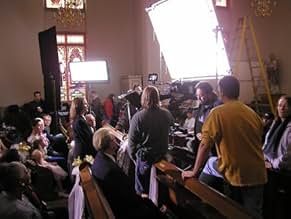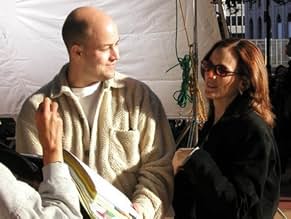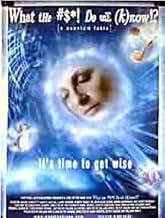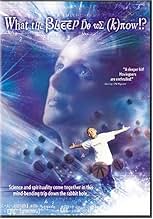Que sait-on vraiment de la réalité!?
Original title: What the #$*! Do We (K)now!?
- 2004
- Tous publics
- 1h 49m
IMDb RATING
5.2/10
14K
YOUR RATING
A fictional photographer's quest to spiritually rediscover herself is interspersed with documentary footage of scientists and theologians discussing the philosophical aspects of quantum phys... Read allA fictional photographer's quest to spiritually rediscover herself is interspersed with documentary footage of scientists and theologians discussing the philosophical aspects of quantum physics.A fictional photographer's quest to spiritually rediscover herself is interspersed with documentary footage of scientists and theologians discussing the philosophical aspects of quantum physics.
- Awards
- 2 wins total
James Langston Drake
- Groom
- (as Jame Drake)
Michele Mariana
- Tour Guide
- (as Michelle Mariana)
Featured reviews
Okay, cult ties or not, this was an interesting film. It offers up a variety of ideas and leaves it to the viewer to decide whether or not to believe. Visually, it was a beautiful film with great art direction and special effects. Marlee Matlin was effective in the main role, although I thought the "story" detracted from the documentary portion of the film.
As to the film's ties to cults--I didn't see anything coercive or subversive in the film. After viewing it, I'm not ready to sell my soul to some guru. OTOH, I do find myself thinking more about the thoughts I have, and the effect they have on my spirit and body. Moral of the story--take out what you will, and don't join a cult. Duh.
As to the film's ties to cults--I didn't see anything coercive or subversive in the film. After viewing it, I'm not ready to sell my soul to some guru. OTOH, I do find myself thinking more about the thoughts I have, and the effect they have on my spirit and body. Moral of the story--take out what you will, and don't join a cult. Duh.
I was not surprised to see many of the comments here about this film calling into question everything about it's premise. While reviewing this film for my newspaper (Cedar Rapids Gazette) I knew immediately that the concepts would be controversial and hard for the conditioned American mind to wrap itself around.
Having said that, it seems that many people view a movie like this as an all or nothing proposition -- if one theory or belief seems flawed, then it all must be called into question. What I think too many polemicists are forgetting is that this picture is a smorgasbord of different theories presented, as Rod Serling might say, for you approval -- or not.
But what many are missing is what makes this film revolutionary -- that filmmakers were able to present these concepts in the medium of film in a way that was at least entertaining and most, thought provoking. You don't have to buy off 100 percent on what is here, but the presentation, in and of itself, was stunning in its bombardment of the viewer with multi sensory imagery.
That this film was even made at all is a mini-miracle, especially in our current intellectual and cultural climate. Its sad to me to see such judgmental reviews. I knew conventional Christians would simply dismiss this as "new age" fluff and I mentioned that in my review. But I would have hoped that lovers of film and higher order thinking would be more tolerant of some of the excesses.
In short, this is a film that needs to be seen not just for its quasi-cinematic, quasi-documentary methodology but for a presentation of theories and beliefs that are rarely discussed in the ossified American mainstream. For that alone, I thank the filmmakers.
Having said that, it seems that many people view a movie like this as an all or nothing proposition -- if one theory or belief seems flawed, then it all must be called into question. What I think too many polemicists are forgetting is that this picture is a smorgasbord of different theories presented, as Rod Serling might say, for you approval -- or not.
But what many are missing is what makes this film revolutionary -- that filmmakers were able to present these concepts in the medium of film in a way that was at least entertaining and most, thought provoking. You don't have to buy off 100 percent on what is here, but the presentation, in and of itself, was stunning in its bombardment of the viewer with multi sensory imagery.
That this film was even made at all is a mini-miracle, especially in our current intellectual and cultural climate. Its sad to me to see such judgmental reviews. I knew conventional Christians would simply dismiss this as "new age" fluff and I mentioned that in my review. But I would have hoped that lovers of film and higher order thinking would be more tolerant of some of the excesses.
In short, this is a film that needs to be seen not just for its quasi-cinematic, quasi-documentary methodology but for a presentation of theories and beliefs that are rarely discussed in the ossified American mainstream. For that alone, I thank the filmmakers.
OK, first I'm going to tear down the "Columbus's ships" thing. I'm fairly certain the Caribbeans had some sort of seaworthy craft, such as rafts or canoes. From these, any normal human intelligence can extrapolate their concept of "boat" to include these ships. Also, where did the writer get this story? Source? Since it's not common knowledge, you need a source.
Next is the direction of time question. In Stephen Hawking's "A Brief History of Time," he talks about the 4 arrows of time accepted by the scientific community at large. While it is true that some fundamental (classical/Newtonian) physical laws don't care which direction time is going, many do. The arrow that I remember (it's been a while since I last read the book) is the thermodynamic arrow of time, which causes us to experience events in such a way that the entropy, or disorder, of the universe increases. For example, a cup falls off a table and breaks, not the other way around.
Ah, then the probability discussion. Yes, for subatomic particles like electrons and quarks, the probability wave is spread out enough that the particle can be in >1 place at a time. However, when you look at anything larger than these specks, the waves get exponentially more concentrated, so that a large (visible w/naked eye) object really has an infinitesimal probability of being in more than one state. So small is this probability that you would have to watch a "large" object say, a tennis ball, for more than the present age of the universe (15,000,000,000 years) for it to have an appreciable chance of doing anything strange.
Closely linked to my last paragraph is the talk about particles popping in and out of existence. The answer to "where do they go" is "they turn back into energy." This is what E=mc^2 means. In the "vacuum" of space, particle/antiparticle pairs of subatomic particles are constantly being created from random energy fluctuations, but these particles are existing on borrowed energy, which they very soon have to repay by annihilating with their mate.
Next is the water conversation. First of all, those pictures were of FROZEN water, which the narrator conveniently forgot to mention, only saying the jars were "left out overnight". Next, the claim that our bodies are 90% water is completely bogus. If that were true, there'd be no way we could so much as stand up. Instead: newborns have around 78%, 1-year-olds around 65%, adult men about 60%, and adult women around 55% (http://www.madsci.org/posts/archives/may2000/958588306.An.r.html).
This sheds doubt upon the rest of this "experiment."
The claim that if you only believe enough, you could walk on water is another seriously questionable one. If it's true, why didn't they show us? Tape someone walking on water. Even though you could fairly easily fake it with some video editing software, it'd still be a little more convincing than them simply telling us it's so. Using this "positive thinking" idea to then say that you create your own reality is equally flawed. Sure, I can very well believe that I live in a world inhabited by one-eyed, one-horned, flying, purple people-eaters, but that's irrelevant if the beings you interact with don't see the world this way.
And then the movie goes on to preach to us about God! How can a "scientific" movie propose to do this? Actually, I have a problem with that one guy proscribing what God is and what He isn't. Shouldn't that be up to the individual, thank you very much? Also in this part, one of the women commentators mentions that we have "antigravity." No, we don't. It's that simple.
Biology's not my thing, but there's a point where you just have to bring out a contradiction. One lady says that if you keep bombarding a cell with a certain chemical, the receptors on that cell will decrease. But soon after, a guy comes on and says that this same daily bombardment will cause the cell to produce a new cell when it divides that has MORE of the receptors. Contradiction. Oops.
I also have to comment on the guy who earlier on this board said this movie would appeal to anyone who's read "The Elegant Universe" by Brian Greene. I strongly disagree; I own and have read that book, and nowhere are its ideas remotely connected to this movie's ideas.
Lastly, I will agree with whoever said the movie is rather drawn out. Especially at the end. They just won't stop talking. They keep on going. Repeating the same stuff over and over. Which is what I'm doing for effect, if you couldn't figure that out.
Next is the direction of time question. In Stephen Hawking's "A Brief History of Time," he talks about the 4 arrows of time accepted by the scientific community at large. While it is true that some fundamental (classical/Newtonian) physical laws don't care which direction time is going, many do. The arrow that I remember (it's been a while since I last read the book) is the thermodynamic arrow of time, which causes us to experience events in such a way that the entropy, or disorder, of the universe increases. For example, a cup falls off a table and breaks, not the other way around.
Ah, then the probability discussion. Yes, for subatomic particles like electrons and quarks, the probability wave is spread out enough that the particle can be in >1 place at a time. However, when you look at anything larger than these specks, the waves get exponentially more concentrated, so that a large (visible w/naked eye) object really has an infinitesimal probability of being in more than one state. So small is this probability that you would have to watch a "large" object say, a tennis ball, for more than the present age of the universe (15,000,000,000 years) for it to have an appreciable chance of doing anything strange.
Closely linked to my last paragraph is the talk about particles popping in and out of existence. The answer to "where do they go" is "they turn back into energy." This is what E=mc^2 means. In the "vacuum" of space, particle/antiparticle pairs of subatomic particles are constantly being created from random energy fluctuations, but these particles are existing on borrowed energy, which they very soon have to repay by annihilating with their mate.
Next is the water conversation. First of all, those pictures were of FROZEN water, which the narrator conveniently forgot to mention, only saying the jars were "left out overnight". Next, the claim that our bodies are 90% water is completely bogus. If that were true, there'd be no way we could so much as stand up. Instead: newborns have around 78%, 1-year-olds around 65%, adult men about 60%, and adult women around 55% (http://www.madsci.org/posts/archives/may2000/958588306.An.r.html).
This sheds doubt upon the rest of this "experiment."
The claim that if you only believe enough, you could walk on water is another seriously questionable one. If it's true, why didn't they show us? Tape someone walking on water. Even though you could fairly easily fake it with some video editing software, it'd still be a little more convincing than them simply telling us it's so. Using this "positive thinking" idea to then say that you create your own reality is equally flawed. Sure, I can very well believe that I live in a world inhabited by one-eyed, one-horned, flying, purple people-eaters, but that's irrelevant if the beings you interact with don't see the world this way.
And then the movie goes on to preach to us about God! How can a "scientific" movie propose to do this? Actually, I have a problem with that one guy proscribing what God is and what He isn't. Shouldn't that be up to the individual, thank you very much? Also in this part, one of the women commentators mentions that we have "antigravity." No, we don't. It's that simple.
Biology's not my thing, but there's a point where you just have to bring out a contradiction. One lady says that if you keep bombarding a cell with a certain chemical, the receptors on that cell will decrease. But soon after, a guy comes on and says that this same daily bombardment will cause the cell to produce a new cell when it divides that has MORE of the receptors. Contradiction. Oops.
I also have to comment on the guy who earlier on this board said this movie would appeal to anyone who's read "The Elegant Universe" by Brian Greene. I strongly disagree; I own and have read that book, and nowhere are its ideas remotely connected to this movie's ideas.
Lastly, I will agree with whoever said the movie is rather drawn out. Especially at the end. They just won't stop talking. They keep on going. Repeating the same stuff over and over. Which is what I'm doing for effect, if you couldn't figure that out.
I wanted to like this film and was prepared for a treat. The visuals and the unusual way of presenting the material was initially stimulating and creative. What made it even easier for me to get involved was that the social ideology advanced closely matches my own. But the expressed connection between particle physics and social prescription was, in my view, either wishful thinking or intellectually dishonest. You can't use the harsh rigors of science to establish credibility and then let your logic go all warm and fuzzy coming to the conclusion you wanted all along -- especially if the conclusion is quite defensible on other bases. As a scientist, I was irritated. As a social liberal, I was embarrassed.
If you want to learn the basics of quantum mechanics, spend your $9 on a used textbook, not this movie. I'm a little worried that the money I spent is being used to buy Kool-Aid for shipment to Guyana.
I don't think the directors really got any point across, but it looks like maybe they were trying to make several: 1) Science can explain everything we do, meaning that our lives are deterministic; 2) Science can't be used to explain everything we do, meaning that we have free will; 3) Science is, like, really cool, brother; 4) We are God; 5) The world exists only in our minds; 6) Sarah Norman is a tough role to follow and 7) here, put this tiny paper square in your mouth and you'll see some really groovy stuff.
I don't think the directors really got any point across, but it looks like maybe they were trying to make several: 1) Science can explain everything we do, meaning that our lives are deterministic; 2) Science can't be used to explain everything we do, meaning that we have free will; 3) Science is, like, really cool, brother; 4) We are God; 5) The world exists only in our minds; 6) Sarah Norman is a tough role to follow and 7) here, put this tiny paper square in your mouth and you'll see some really groovy stuff.
Did you know
- TriviaJohn Gorenfeld wrote in a September 2004 Salon article that David Albert, one of the interviewed experts in the film, feels he was duped and misrepresented as to the real purpose and agenda of the movie. "Albert, a professor at the Columbia University physics department, has accused the filmmakers of warping his ideas to fit a spiritual agenda. 'I don't think it's quite right to say I was "tricked" into appearing,' he said in a statement reposted by a critic on What the Bleep's Internet forum, 'but it is certainly the case that I was edited in such a way as to completely suppress my actual views about the matters the movie discusses. I am, indeed, profoundly unsympathetic to attempts at linking quantum mechanics with consciousness. Moreover, I explained all that, at great length, on camera, to the producers of the film ... Had I known that I would have been so radically misrepresented in the movie, I would certainly not have agreed to be filmed. I certainly do not subscribe to the 'Ramtha School on Enlightenment," whatever that is!' he finished. Albert provided Salon with an excerpt from a piece he's writing on the subject, in which he says, in part, 'I'm unwittingly made to sound as if (maybe) I endorse its thesis.' When told of Albert's complaints, [Meyer Gottlieb, president of the movie's distributor, Samuel Goldwyn Films] said, 'I certainly don't see it,' but acknowledged he's 'not into the science 100 percent.'"
- GoofsDepiction of quantum mechanics in the movie bears no resemblance to the real theory of that name. In particular, the common misconception that the "observer effect" is dependent upon a sapient, human observer is incorrect. If any object interacts with any other, and either requires information regarding the current state and properties of the other, then that constitutes an observation.
- Crazy creditsThe Scientists, Mystics and Scholars interviews herein were chosen based on the expertise in the subjects which they discussed. They do not necessarily agree with all viewpoints put forth in the film. Likewise the Filmmakers may not agree with all the viewpoints put forth by the Interviewees. Agreement is not necessary - thinking for one's self is.
- ConnectionsFeatured in Brows Held High: Mr. Nobody and Living in Bad Faith (2015)
- How long is What the #$*! Do We (K)now!??Powered by Alexa
Details
- Release date
- Country of origin
- Languages
- Also known as
- What the #$*! Do We (K)now!?
- Filming locations
- Production companies
- See more company credits at IMDbPro
Box office
- Gross US & Canada
- $10,942,306
- Opening weekend US & Canada
- $7,655
- Feb 8, 2004
- Gross worldwide
- $21,054,050
- Runtime1 hour 49 minutes
- Color
- Sound mix
- Aspect ratio
- 1.85 : 1
Contribute to this page
Suggest an edit or add missing content

Top Gap
By what name was Que sait-on vraiment de la réalité!? (2004) officially released in Canada in English?
Answer



































